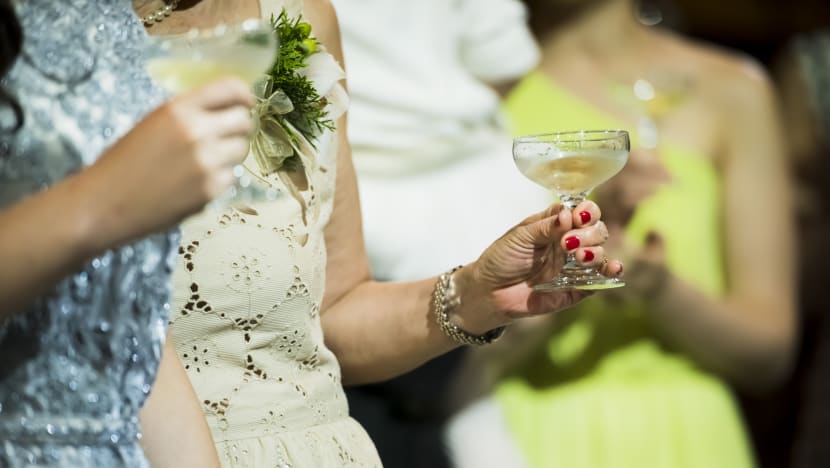Commentary: Why are people spending more on travel and weddings even as prices go up?
Despite rising inflation and gloomy economic forecasts, demand for special experiences and goods has returned with a vengeance. Terence Heng takes a look at the social aspects of consuming at all costs.

LIVERPOOL, England: For those of you with an eye on travel, you will have no doubt seen pictures and videos of absolute carnage in airports across the northern hemisphere.
As aviation hubs struggle to meet resurgent demand this summer, mountains of lost luggage, cancelled flights and crying children are all too common.
But despite bottlenecks and more expensive fuel, many are still adamant about having a holiday. One only needs to see the traffic queues from Singapore to Johor Bahru to know that this is not restricted to any one country or culture.
It is not just holidays that appear to be what economists call “price-inelastic” (when demand abates less as prices rise). Recent news reports in Singapore note how wedding venues are experiencing a surge in bookings now that COVID-19 restrictions are being eased.
Popular venues like the JW Marriott Hotel Singapore South Beach are almost booked out for the rest of the year, while Regent Singapore saw twice the number of wedding bookings in 2022 compared to 2021 or 2020.
It appears to be that come what may, Singaporeans will find a way to spend.
SHOWING OFF, PARENTAL PRESSURE, OR BOTH?
It would be too easy to dismiss such spending simply as an effort to show off. Certainly there’s a certain level of conspicuous consumption present in hiring a “celebrity photographer” for a wedding, or uploading an Instagram story from an exotic locale.

Economists call these goods and experiences “Veblen goods” – items perceived to be of a high-quality for which demand rises as prices go up, because of their ostentatious value. Such goods need not even be high-quality as long as they confer some kind of social status through their consumption.
In weddings, we see how everyday life intersects with sociology. Individuals place significant meaning on such rites of passage, because not only do they signify a change in status (single to married), they also signal various things society associates with achievement. Wealth is one, but “taste” in choosing the right outfit and venue is another.
It may not even be the case where couples feel they have to demonstrate this to their peers. Rather, consumption becomes an act of filial piety. The common refrain is “I’m doing it for my parents”, implying that the ostentation is achievement by proxy – the success (or performed success) of one’s children reflects one’s success as a parent and member of society.
Which might explain in some cases why many couples feel it necessary to host large banquets and gatherings, and why wedding venues know couples have little choice but to stomach exorbitant prices.
But it is not just weddings and luxury goods that are becoming more expensive. Everything has become more expensive. My mother bemoans the price of peanut butter while waving a jar at the camera in our Zoom calls. My wife gawks at the price of chicken. I cry softly when I fill my car up at the petrol station.
When it comes to everyday goods, individuals change their purchasing habits more readily when their usual choices exceed their budget – for instance, eating less fresh meat and fish, and more rice and staples.
It is little wonder then, that regardless of where one is on the economic hierarchy, we either indulge in luxuries now before the bigger ticket items become further out of reach, or we decide to focus our spending on the things that really matter.
MAKING MEANING BY SPENDING TIME AND MONEY
One of these things is our religious commitments. Recent stories in the news have shown that even the dead are not immune to inflation. Prices for joss paper offerings, which some Chinese families burn for ancestors during the seventh lunar month, have increased by up to 20 per cent.
Yet store owners say they expect demand to rise regardless, given how religious activity has been curtailed in recent years.
Religious goods to honour the dead are a curiosity because they are not always ostentatious (unless you’re really showing off at a funeral), but neither are they an “essential” in the same way water or shelter are essentials. But they are certainly part of how individuals make sense of their lives, and how, as sociologists would say, “make meaning”.
In a previous commentary I noted how, despite inconveniences and traffic jams, Qing Ming will always be observed because it is not just about tradition, but about engaging in the emotional labour of ritual, belonging and family.
Similarly, other “special occasion” items like mooncakes continue to command a premium. Fancy boxes and ingredients are one reason for near-extortionate prices, but the desire for individuals to possess and gift mooncakes is clearly a driver for demand.
Perhaps inelastic pricing on “special things” demonstrate or reveal to us norms and values we idealise. Holidays at all costs are how we fulfil our desire for a work-life balance, even if such balances do not exist. An expensive wedding is our way of marking the event as meaningful, because expenditure signals investment.
In a society where almost anything can be bought or sold, our values and ideals can be commodified too.
THE VALUE OF VALUES
Yet at what point can we say that the amount we spend equates to love, filial piety and familial loyalty? In other words, to what extent can we put a monetary value on something intangible?
The temptation to count is always there, as a consequence of living in a capitalist, technocratic society. We have been socialised to think that more and new is always better – so much so that even certain versions of the afterlife are places to brand-signal as well, with shops selling joss paper replicas of the latest MacBook Pros and iPhones.
At the same time, I do not think the answer is to completely detach ourselves from rituals, whether religious or otherwise. Rituals and ceremony are a core part of what makes us human. Our collective partaking in rituals create forms of solidarity within and between groups.
What we have to be careful about, and what we have to ask ourselves, is whether spending truly symbolises our ideals, or whether it is our way of one-upping each other.
Terence Heng is a senior lecturer in Sociology at the University of Liverpool, UK, where he is also an associate at the Centre for Architecture and the Visual Arts.





















